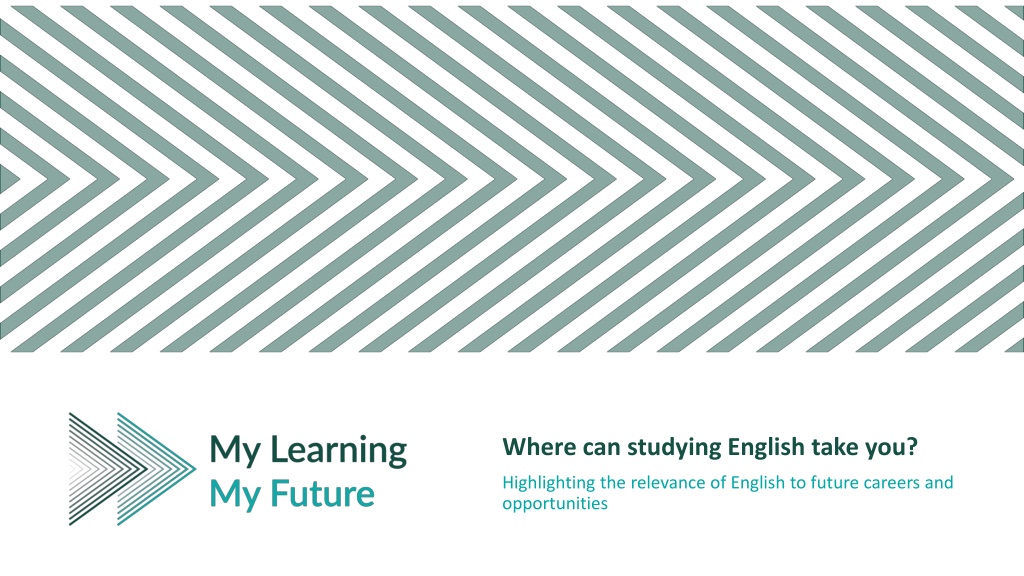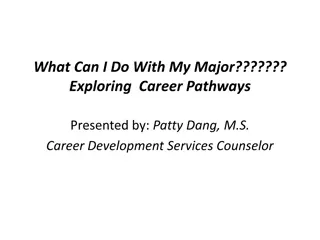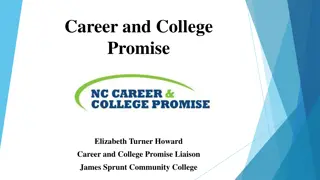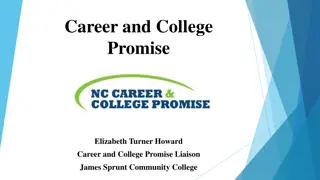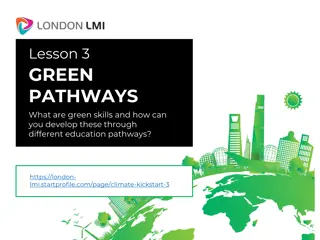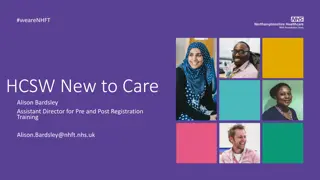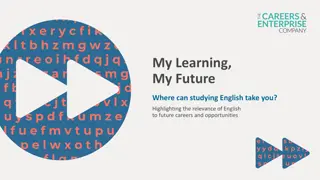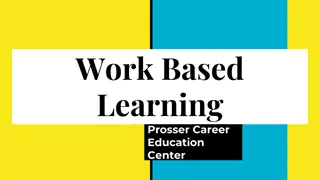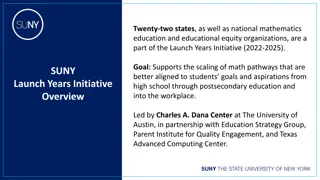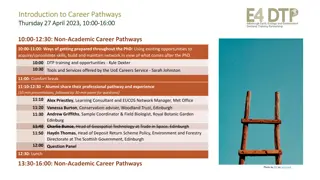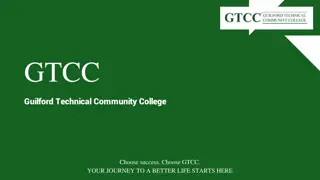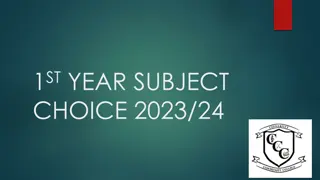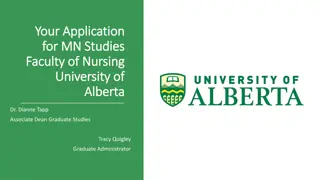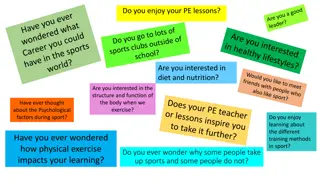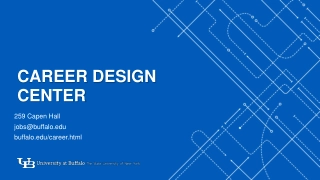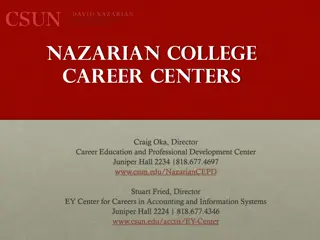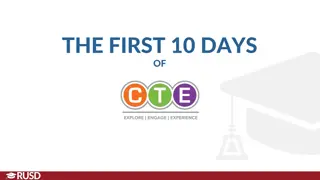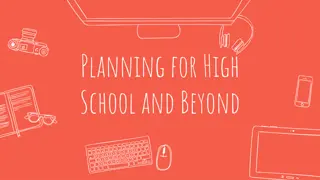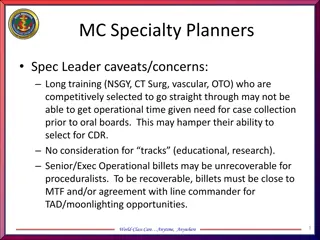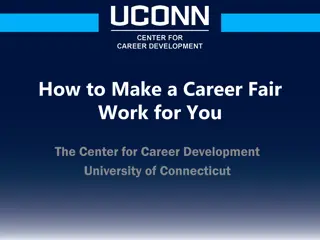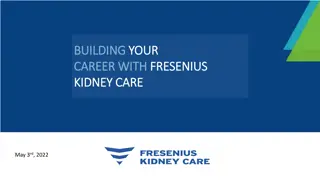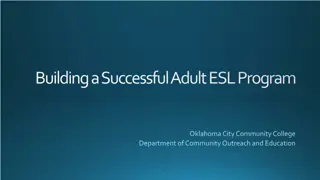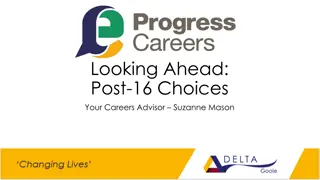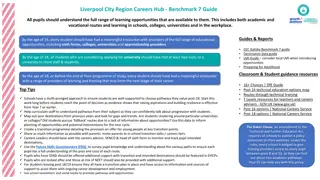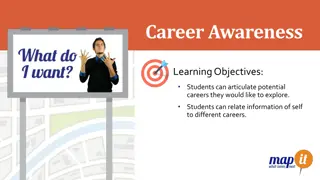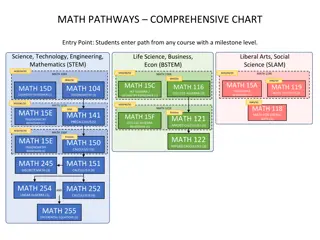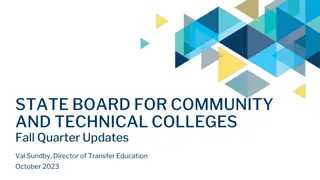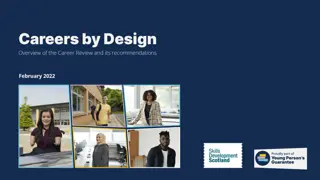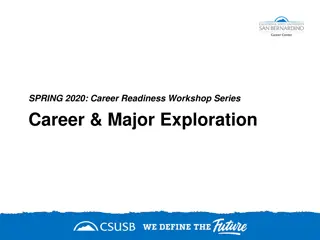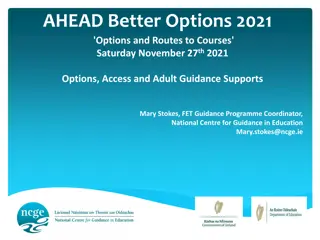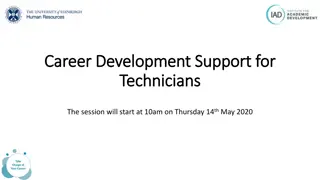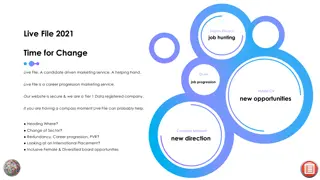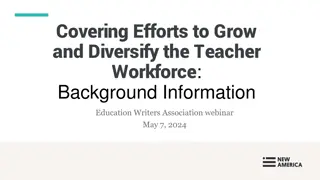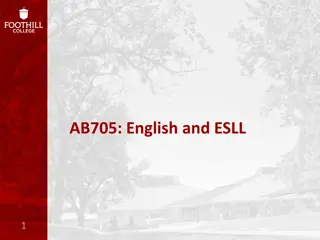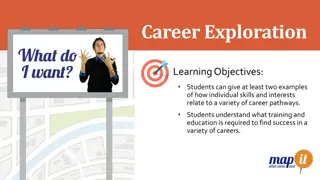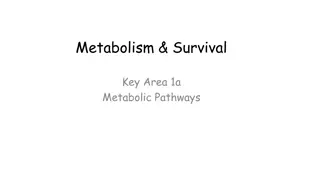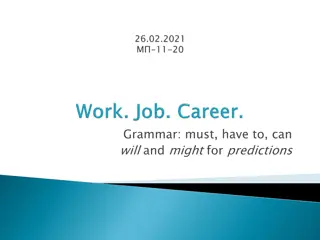Exploring Career Opportunities and Pathways with English Studies
Studying English opens doors to various career paths like writer, journalist, solicitor, teacher, and more. This article delves into the relevance of English in shaping future careers, highlighting the skills needed, typical tasks, salary insights, and progression opportunities in fields utilizing English language expertise.
Download Presentation

Please find below an Image/Link to download the presentation.
The content on the website is provided AS IS for your information and personal use only. It may not be sold, licensed, or shared on other websites without obtaining consent from the author. Download presentation by click this link. If you encounter any issues during the download, it is possible that the publisher has removed the file from their server.
E N D
Presentation Transcript
Where can studying English take you? Highlighting the relevance of English to future careers and opportunities
What do you think these roles involve (daily task, etc.)? What pathways can you take with this subject? Why English matters Have you ever considered where studying English can take you? What careers can you think of that use English? Today, we ll be exploring some of the career opportunities that are available to you, as well as the various pathways you can take to get there. Why is English an important subject? How will English help me? - MYPATH What skills do you think you might need for these roles?
Writer BBC Bitesize case study BBC Bitesize case study Explore a career as a BBC Bitesize case study Advertising Copywriter Here are some example roles and careers linked to BBC Bitesize case study BBC Bitesize case study English Journalist (Broadcast/Magazine/Newspaper) BBC Bitesize case study BBC Bitesize case study BBC Bitesize case study
Solicitor BBC Bitesize case study Explore a career as a BBC Bitesize case study iCould case study Primary School Teacher iCould case study Here are some example roles and careers linked to BBC Bitesize case study English Senior Content Executive BBC Bitesize case study iCould case study
Discover more about the role Explore careers using National Careers Service and find out about what jobs involve and how they are right for you Research Ideas: Includes: Writer Advertising Copywriter Journalist Solicitor Primary School Teacher Senior Content Executive Average salary Typical hours Work patterns Pathways/How to become Essential Skills Daily tasks Career path and progression Current opportunities
Job Why not teach English? Start in the classroom, where you go from there is up to you. Bring your passion for your subject, keep learning, and pass your knowledge onto others No two days are the same and neither are the pupils Once qualified you can teach throughout your life You could teach abroad Progress your career into leadership and management Bring your outside interests into the classroom and your subject Explore teaching Shaniqua s Story Jem s Story Daniel s Story Shaniqua s Story Jem s Story Daniel s Story What makes a great teacher? What makes a great teacher? The right skills to teach? Work well in a team? Love to nurture imagination? Love to keep learning? Work well in a team? Love to nurture imagination? Love to keep learning?
GCSE While there are different routes you can take to be a teacher there are a few essential things that you will need: A minimum GCSE Grade 4 or above in English and maths (plus science if you want to teach primary) A degree or equivalent qualification A level T Level Apprenticeship Vocational/Technical Qualification Apprenticeships are jobs which combine practical work and study. Intermediate is Level 2, Advanced is Level 3 T Levels are nationally recognised, technical qualifications for 16 19-year-olds. Designed by leading employers, one T Level is equivalent in size to 3 A levels These include BTEC, Applied General Qualifications (AGQ) and Vocational Technical Qualifications (VTQ) all at Level 3 A levels are 2 years of study Level 4/5 qualifications Higher apprenticeships Degree Higher level apprenticeship (foundation degree / Level 5) Complete a degree course Complete a L4/5 course and top up to a degree L4/5 includes Certificate of HE, Diploma of HE, Higher Technical Qualification (HTQ), HNC, HND and Foundation degrees It is possible to get QTS as part of an undergraduate degree, for example: Degree apprenticeships Bachelor of Arts (BA) with QTS Bachelor of Education (BEd) with QTS Bachelor of Science (BSc) with QTS Degree apprenticeship (Level 6-7). There is a Level 6 Teaching apprenticeship programme Top up to a degree (Level 6) in a year of full-time study Initial Teacher Training (ITT) with qualified teacher status (QTS) Teacher
Why not teach activity? Job Pick a topic in English you think you would like to try and teach Agree your choice of topic with your teacher and the length of session (and with which group) (It may be the perfect opportunity to try this with a younger class lower down the school, or as a transition activity for Y6) Plan a short activity to cover the topic in a way you feel will be engaging and memorable for your peers as part of a lesson starter, main activity or plenary Consider: What are you trying to achieve (teach)? Be clear what information you intend to impart How will you make it fun? How will you make it 'stick'? How long will this take? What type of activity will you plan for? (written/practical) How will you know others have learned it? How will you make sure everyone is stretched and challenged? What will the end-product be? Once you have checked it with your teacher, try the lesson with a small group (as agreed by your teacher) Try and get feedback during and after the session from those in the lessons and from the teacher After, consider: What you enjoyed about the experience Whether this is something, with training, you would enjoy How you felt when others learned from you
Non-obvious jobs using English: Ever thought about..? 5| Civil Service Mnager | Explore careers | National Careers Service Careers ideas and information - English How to become the 'Baby of the house' in Politics How to become a Solicitor's Apprentice: Jacob's story Community Education Co-ordinator | Explore careers | National Careers Service Efl Teacher | Explore careers | National Careers Service How to become a Recruitment consultant: Emily's story https://www.bbc.co.uk/bit esize/articles/zhst2sg https://nationalcareers.ser vice.gov.uk/explore-careers
MYPATH Job of the week (English) Barrister Journalist Drama Therapist
MYPATH English: Why bother? Poetry: Writing Skills: Reading Skills: Drafting Poetry Formal and Informal Writing Grammar Analysing Persuasive Texts Understanding Rhythm Atmosphere and Setting Non-Fiction Preparing and Drafting Character Speaking Skills: Debating and Arguing Sentences Punctuation Sentences Dialect and Slang Spelling Drama Tone and Style Writing to Advise Speaking Please be aware MYPATH are adding new videos so keep checking here for additions Vocabulary Writing to Analyse
Sustainability means meeting our own needs without compromising the ability of future generations to meet their own needs. (UN definition) English careers in a changing world: How can I future-proof my career pathway? The world will be changing drastically in the next few years to cope with the impacts of climate change and nature loss, and the need to lower greenhouse gas emissions and unsustainable practices. How might this steer your choice of career path using your English skills?
Every career can be sustainable 1. Use your skills and passion for sustainability to help businesses adapt 2. Work for a company with sustainable values 3. Innovate for a sustainable future English careers in a changing world Environmental Lawyer Environmental Journalist
English Pathways 7| Combine Study and Work Study Work
7| Combine Study and Work Apprenticeships T Levels T Levels | National Careers Service T Levels | Education and Childcare T Levels | Media, Broadcast and Production T Levels | Legal Services Public Relations Assistant Journalist Solicitor Teaching Assistant Digital Marketer Hospitality Team Member Social Worker Advertising Executive Bid and Proposal Co-ordinator Publishing Assistant Police Constable VTQs Vocational Technical Qualifications (VTQs) | National Careers Service English for Business Communications English Language Teaching English for Literacy Education and Training Applied law Entry level English Find more >
7| Study Pathways A levels A levels | National Careers Service You might find courses in: HTQs (Higher Technical Qualifications) Higher technical qualifications (HTQs) | National Careers Service English Literature English Language Drama English Language and Literature You might find courses in: Film Studies Media Studies Law and Practice Public Services (Law, Criminology, Psychology and Sociology) Leadership and Management Social Services English Language English and Creative Writing Higher education Higher education | National Careers Service You can explore undergraduate courses in English You might find courses in: English English Literature Drama and English English Language and Linguistics English Literature and Publishing Advertising, Marketing Communications & Public Relations American Literature and Creative Writing Primary and Early Years Education International Relations and Policy Study Media & Communication and Creative Writing Children and Young People's Education, Curriculum and Development
7| Work Pathways Supported internships with an education, health and care plan School leaver schemes School leaver schemes | National Careers Service Supported internships | National Careers Service Watch Saul s story You might read about: How to fill in an application form You might read about: How to write a CV Access to Work Funding (if you have a disability or health condition) Interview help Preparing for Adulthood Progressing your career (Careers Advice from NCS) Talking Futures (A parents' toolkit for career conversations)
7| University League Tables See at a glance the university ranking for English English Rankings (thecompleteuniversityguide.co.uk) Filter by: Overall score Entry standards Student satisfaction Research quality Research intensity Graduate prospects
1.Go to https://discoveruni.gov.uk/ 2. Search for a course or subject (You should get a page of search results, you can filter these by university or college, whether you want to study full or part time or perhaps you want to see that courses are near you) Discover Uni Once you have had a look at a few different courses and subjects now it is time to compare some side by side Have you ever considered if higher education is right for you? 3. Check out this video which shows you how to use our comparison tool https://youtu.be/dBFzCQgTp8I - Pick 5 courses and add these as a saved course and then you can compare 4. Once you have your chosen five side by side, try to answer the following questions: a. What kinds of qualifications do students on the course have when they start the course? b. How many have a placement year? c. How many courses let you study abroad? d. Which has the highest student satisfaction rating? How do you know this? e. What kinds of job do graduates from this course go on to? f. Which course has the highest salary after three years? (higher/lower than national average) g. Choose your favourite course and explain why you chose this course over the others? discoveruni@officeforstudents.org.uk
Discover Uni 1.Go to https://discoveruni.gov.uk/ 2. Search for a course or subject (You should get a page of search results, you can filter these by university or college, whether you want to study full or part time or perhaps you want to see that courses are near you) Have you ever considered if higher education is right for you? Once you have had a look at a few different courses and subjects now it is time to compare some side by side 3. Check out this video which shows you how to use our comparison tool https://youtu.be/dBFzCQgTp8I - Pick 5 courses and add these as a saved course and then you can compare 4. Once you have your chosen five side by side, try to answer the following questions: Is the data I am looking at for a course or a subject? a. What year, or years, does the data relate to? b. How many students or graduates is this data based on? c. Does the data represent all the students on the course or subject area? d. Does the data include people like me? e. What factors might impact the data? discoveruni@officeforstudents.org.uk
Teach English as a Foreign Language (TEFL) What is TEFL? Sometimes known as (TESOL, TESL, ESL) all refer to teaching English to English language learners Why? Start something new Opportunity to travel to other parts of the world, broaden your travel experience Gain professional experience Earn somewhere away from home Great for you C.V. Where? Most countries require a TEFL qualification; a number also require a degree. You can also tech English online from the comfort of your own home. You can teach almost anywhere.
Teach English as a Foreign Language (TEFL) The TEFL Qualification Beginner courses @ 120 and 200 hours, either online or in-person, with continual assessments over the course. It should cover: lesson planning, English grammar, handling classes of various sizes and abilities, ideas to keep students engaged and interested. Choose an accredited course. Here are the approved providers. What else? Visa requirements Start up costs
Job in 10 years time (related to English): _________________________________________ 1| What GCSEs helped you get this job: ______ ______ ______ ______ ______ ______ In 10 years time What KS5 Pathways choice did you make and what did you study: Apprenticeship T level A Level other L3 equivalent ___________________________________________________________________ Post 18 pathways choices did you make: explain: Study & Work Study Work _____________________________________________________________________ Essential skills used in the job: ________________________________________________ Progression route: __________________________________________
Subject chosen (related to English): _____________________________________________________________________________________ Other options: Local apprenticeships options: Local college options: __________________________________________________________________ __________________________________________________________________ __________________________________________________________________ 2| __________________________________________________________________ __________________________________________________________________ __________________________________________________________________ The pros and cons of these options for me: Pros: Cons: My local options _____________________________ _____________________________ Consider how these will apply and explain: Cost _________________________________________________ Travel ________________________________________________ Convenience __________________________________________ Aspirations ____________________________________________ Personal circumstances __________________________________ Other ________________________________________________ Final choice justify: __________________________________________________ ________________________________________________ Next steps: __________________________________________________________
Prepare a 3 - 5 minute talk to share with a small group on any role that interests you related to English 3| Where do you need to go to carry out the role What's the role Where has the interest come from What's the chances of getting this role What do you need to do to become one Who do you look up to in this role Where can you go to study and what level of study What might a typical day look like
4| My career path .
8| Skills Builder Resource KS3 Skills Builder Resource KS4 Skills Builder Resource Post 16 Essential Skills Video Short Lesson Speaking Step 10-12 The oral transmission of information or ideas Here are three key skills needed for a career that uses Watch here Short Lesson Speaking Step 6-8 Short Lesson Speaking Step 8-10 The receiving, retainingand processing of information or ideas Short Lesson Listening Step 10-12 Watch here Short Lesson Listening Step 6-8 Short Lesson Listening Step 8-10 English The ability to set clear, tangible goals and devise a robust route to achieving them Short Lesson Aiming High Step 10-12 Short Lesson Aiming High Step 6-8 Short Lesson Aiming High Step 8- 10 Watch here
8| Tick which apply Speaking Step 6 I speak effectively by using appropriate tone, expression and gesture Step 7 I speak engagingly by using facts and examples to support my points Step 8 I speak engagingly by using visual aids to support my points Step 9 I speak engagingly by using tone, expression and gesture to engage listeners I speak adaptively by changing my language, tone and expression depending on the response of listeners Step 10 Step 11 I speak adaptively by planning for different possible responses of listeners Step 12 I speak adaptively by changing my content depending on the response of listeners My Strength (s) My area (s) of Development
8| Tick which apply Listening Step 6 I show I am listening by how I use eye contact and body language Step 7 I show I am listening by using open questions to deepen my understanding Step 8 I show I am listening by summarising and rephrasing what I have heard Step 9 I am aware of how a speaker is influencing me through their tone Step 10 I am aware of how a speaker is influencing me through their language Step 11 I listen critically and compare different perspectives Step 12 I listen critically and think about where differences in perspectives come from My Strength (s) My area (s) of Development
8| Aiming High I can do this Step 6 I set goals informed by understanding of what is needed Step 7 I set goals, ordering and prioritising tasks to achieve them Step 8 I set goals and the right resources to achieve them Step 9 I set goals and plan to involve others in the best way Step 10 I create plans that are informed by my skill set and that of others Step 11 I create plans that include clear targets to make progress tangible Step 12 I create plans that are informed by external views, including constructive criticism My Strength (s) My area (s) of Development
Homework Use the National Careers Service Explore careers tool to research for this homework Explore here
